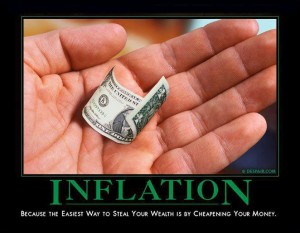Expectations play a major role in determining the reality. Specifically, expectations have a significant role in the occurrence of economics events. Various economic events are just the reflection of its expectations.
The theory of rational expectations tells that the expectations formed by using all the relevant information drives the whole economy and indicates what the future state of economy would be.
Sometimes it is the expectations itself that leads to the actual happening of that event. To get a clear view, think about the share prices in the capital markets.
Share prices
Prices in stock market vary according to the changes in the forces of demand and supply. But what changes the demand and supply is the expectations prevailing in the market. If a share is expected to give higher returns, its demand will increase. This increase in demand causes the share price to rise eventually. Thus returns are increased by trading the share. It is ‘self fulfilling expectation’.
Generally, share prices are rather dependent on irrational expectations. And that is what accounts for the losses from trading in stock market. People usually engage in herd behavioral trading. Blindfolded, influenced by others and without using rational information they end up incurring losses.
Inflation
The same phenomenon applies to inflation. Inflationary expectations are one of the factors that lead to the actual inflation. Expectation of high prices in future tends the agents to increase the wages (so that real wage is unaffected), raising the expenses and thus raising prices. Here just an expectation of high inflation causes it to actually happen.
We can see the pre-monsoon inflation situation on similar notes. The revised forecast by Meteorological department indicated a poor monsoon. Risk of drought was dwelling over several parts of the country. There was expectation of rise in food inflation in the near future. Moreover, the recent cut in the repo rate by 0.25% was expected to stimulate spending in the economy and will result in increase in inflation to a bit. Using the relevant information, economic agents formed rational expectations. The RBI too raised the inflation forecast of January 2016 from 5.8% to 6%.
Aggregate Demand
Consumption and aggregate demand are also affected by how the expectations are formed. An expectation of increase in income in the future increases the current consumption. If everyone believes the same then, this will lead to an increase in the aggregate demand for goods and services in the economy. Thus production will rise and national income will increase fulfilling the expectation of increased income.
*****
Expectations strongly influence the reality. They help in forming current decisions based on future predictions.
Also, it is not always the same as predicted and should not be confused with exact replica of expectations, rather it is considered an important determinant of uncertain future. Hence it is important that economic agents make rational expectations using all required information and take decisions accordingly.
It is rightly said that “Failing to plan is planning to fail”.



20 Comments. Leave new
Good one !
Well written!
Very true! Expectations are crucial in determining the success of government policies for not just inflation but also unemployment.
Very nicely explained.
We usually expect a lot before doing anything. We should work fr that rather than only expecting.
Very well written.
interesting
Nice work!
Very well written ?
Well written article !! Good job! Well..economy does work on expectations. In fact what’s going to happen in future affects our present consumption. Every firm always plans its future course of action based on economic predictions and expectations. Everything in this economy revolves around expectations. Quite intriguing article!
well written.
Good efforts!
Definitely! for an economist it’s very important to take some expectations into consideration
Thanks a lot everyone!
Good efforts.
very nicely written!!
Good work!
nice work…
Thank you everyone!
Informative and well written